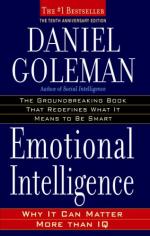
|
| Name: _________________________ | Period: ___________________ |
This test consists of 15 multiple choice questions and 5 short answer questions.
Multiple Choice Questions
1. John Mayer is a psychologist at what institution?
(a) Columbia University.
(b) New York University.
(c) Claremont Graduate University.
(d) The University of New Hampshire.
2. The author refers to EI as which of the following?
(a) A clinical disease.
(b) An adverse reaction.
(c) An inherited gene.
(d) A meta-ability.
3. What is the first part of the human fetal brain to develop?
(a) The hippocampus.
(b) The brainstem.
(c) The neocortex.
(d) The amygdala.
4. Alexithymics may suffer from a disconnection between the limbic system and what?
(a) The left pre-frontal lobe.
(b) The olfactory lobe.
(c) The neocortex.
(d) The brainstem.
5. For what publication did Daniel Goleman write for twelve years, specializing in psychology and brain sciences?
(a) The New York Times.
(b) The Denver Post.
(c) The San Francisco Chronicle.
(d) The Chicago Tribune.
6. The Stanford-Binet Intelligence Test was originated in what country?
(a) Germany.
(b) France.
(c) Russia.
(d) Norway.
7. The left pre-frontal lobe of the brain can turn off or dampen what emotion?
(a) Love.
(b) Anger.
(c) Distress.
(d) Empathy.
8. In 1916, at Stanford University, what psychologist released a revised examination which became known as the "Stanford–Binet test"?
(a) Robert Hare.
(b) Lewis Terman.
(c) Bruce McEven.
(d) Robert Levenson.
9. What release is a crucial component of the fight-or-flight response of the sympathetic nervous system?
(a) Carbon Dioxide.
(b) Oxygen.
(c) Adrenaline.
(d) Carbohydrate.
10. Psychologist C. R. Snyder studied students’ grades in relation to their level of what?
(a) Family wealth.
(b) Time spent watching television.
(c) Hope of success.
(d) Community involvement.
11. What term refers to a learning disability in reading nonverbal messages?
(a) Dyspraxia.
(b) Dyscalculia.
(c) Dyssemia.
(d) Dyslexia.
12. What is medically recognized as a mental and emotional condition in which a person experiences intense feelings of depression, discontent and indifference to the world around them?
(a) Depression.
(b) Dysphoria.
(c) Bipolar disorder
(d) Narcissistic personality disorder.
13. Charisma combines four separate interpersonal intelligence components, according to what two psychologists discussed in Part Two: Chapter 8, “The Social Arts”?
(a) Mihaly Csikszentmihalyi and T. Berry Brazelton.
(b) Ulf Dimberg and Peter Salovey.
(c) Thomas Hatch and Howard Gardner.
(d) Ted Huston and Martin Seligman.
14. Psychologists Lizabeth Roemer and Thomas Borkovec work at what university?
(a) Yale University.
(b) Pennsylvania State University.
(c) The University of Iowa.
(d) New York University.
15. Venting anger generally does what, according to the author in Part Two: Chapter 5, “Passion's Slaves”?
(a) Reduces it.
(b) Fuels it.
(c) Justifies it.
(d) Acknowledges it.
Short Answer Questions
1. Psychiatrist Daniel Stern identified the process of reinforcing empathy in children as what?
2. Dr. Antonio Damasio works at the College of Medicine at what university?
3. Fear arouses the body to fight or flight by doing what within the body?
4. What notable book did psychiatrist Daniel Stern write?
5. What kind of specialist is Joseph LeDoux?
|
This section contains 465 words (approx. 2 pages at 300 words per page) |

|




